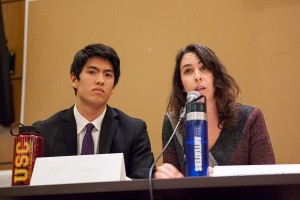Campus forum focuses on oil extraction near USC
On Wednesday, the Political Student Assembly held a debate at the Ronald Tutor Campus Center on oil drilling activities near USC.

Heated debate · Ivan Kumamoto, of the Environmental Affairs Organization, and community organizer Alexandra Nagy discuss fracking. – Ralf Cheung | Daily Trojan
A panel of students and community members divided into two groups — one “for” and one “against” the drilling activities and related operations such as hydraulic fracturing — and argued the fiscal benefits and detriments, environmental implications, political implications and health impacts involved with the activities.
Representing the “for” side was Giuseppe Robalino and Jennifer Massey of the USC College Republicans, and Mohammad Javaheri, a Ph.D. student in petroleum engineering and member of the USC Society of Petroleum Engineers. Representing the “against” side were Monica Uriarte and Nalleli Cobo, two residents who live near one of the oil drilling sites, Alexandra Nagy, a community organizer with Food & Water Watch and Ivan Kumamoto, a member of USC’s Environmental Affairs Organization.
The operations that sparked the debate were the Freeport-McMoRan Oil & Gas Company site on Jefferson Boulevard and the Allenco Energy, Inc. site located on West 23rd Street.
As one of the environmental issues getting major coverage in the media, hydraulic fracturing, or “fracking,” dominated the debate. This practice involves the high-pressure injection of fluid into an oil or gas reservoir to allow for better recovery of the resource being extracted.
Regarding this practice, Robalino and Massey argued that there is a lot of misinformation and scare tactics clouding the argument. The panelists said that a debate should be centered on the facts, not emotion. Javaheri cited the benefits of fracking, highlighting that it reduced the United States’ dependence on coal as an energy source.
“Renewables cannot replace natural gas,” Javaheri said.
Alternatively, Uriarte and Cobo cited the oil and gas energy industry’s political power and argued that there were externalized costs that oil industry proponents were not taking into account such as environmental and public health impacts.
Kumamoto highlighted the difference between drilling where nobody lives and drilling where there are a lot of residents. Uriarte showed the audience Styrofoam heads marked to show ailments that residents in her community have been experiencing.
“I’m not getting emotional, I’m getting real,” she said.
As the debate progressed, the sides went back and forth disputing studies regarding the economic impacts and public health impacts of fracking. Whether or not fracking was actually occurring on Jefferson Boulevard, however, was not directly addressed.
During the Q&A portion of the event, Bilal Hakim, a graduate student studying petroleum engineering and the event coordinator for the USC Society of Petroleum Engineers relayed information obtained from Freeport-McMoRan that no fracking was actually occurring or will be occurring at the Jefferson site.
“We have been coexisting with oil wells. Just because people made two or three documentaries and raised a media hype, all of a sudden you’re asking the question: ‘What would you do if you have to live with these things?’ We have been living with these things. People just don’t know about it,” Hakim said. “We have been coexisting with oil wells in our backyard, you just have to look for it.”
Alina Evans, a first-year graduate student in public diplomacy, previously lived adjacent to the Jefferson site and wrote an Oct. 8, 2013 opinion article for Neon Tommy on the subject. Evans said that she has not experienced any health effects from the two months that she lived near the site. She moved from the building because of the activity.
“It smells like the La Brea Tar Pits. It is lit up like a space station at night, so I had to buy blackout curtains for my windows,” Evans said.
Follow us on Twitter @dailytrojan
